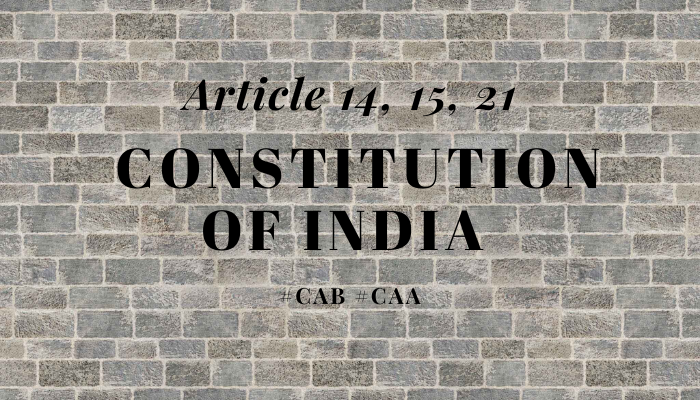Disclaimer – This is just based on interpretation of the legal library and does not endorse any personal or professional views of any living or dead person.
The country is witnessing an unprecedented debate and protests on CAB with the Government trying to reassure people that there is nothing to be afraid of for any Indian citizen of any denomination. The opposition, on the other hand, is painting the bill as a draconian instrument that goes against the secular credentials of the country and targets the Muslim community in particular citing violation of Article 14, 15 and 21 of The Constitution of India.
The opposition here is misleading the population of India, This can be established by studying the Articles of the Indian Constitution, Articles 14, 15 and 21 are clause mentioned in Part III of the Constitution which is “Fundamental Rights of the Citizens of India”. Clause related to “Citizenship” are covered in Part II of the Constitution.
If we decode the Article 14 of Constitution –
“ Right to Equality
The State shall not deny to any person equality before the law or the equal protection of the laws within the territory of India. ”
– This clause refers to “Right to Equality” of Indian citizens before the law and equal protection within the territory of India.
If we decode the Article 15 of Constitution –
“ 15. (1) The State shall not discriminate against any citizen on grounds only of religion, race, caste, sex, place of birth or any of them.
15 (2) No citizen shall, on grounds only of religion, race, caste, sex, place of birth or any of them, be subject to any disability, liability, restriction or condition with regard to—
(a) access to shops, public restaurants, hotels and places of public entertainment; or (b) the use of wells, tanks, bathing ghats, roads and places of public resort maintained wholly or partly out of State funds or dedicated to the use of the general public.
15 (3) Nothing in this article shall prevent the State from making any special provision for women and children. 1 [(4) Nothing in this article or in clause (2) of article 29 shall prevent the State from making any special provision for the advancement of any socially and educationally backward classes of citizens or for the Scheduled Castes and the Scheduled Tribes.] 2 [(5) Nothing in this article or in sub-clause (g) of clause (1) of article 19 shall prevent the State from making any special provision, by law, for the advancement of any socially and educationally backward classes of citizens or for the Scheduled Castes or the Scheduled Tribes in so far as such special provisions relate to their admission to educational institutions including private educational institutions, whether aided or unaided by the State, other than the minority educational institutions referred to in clause (1) of article 30.] ”
– Clause 15 (1) (2) (3) lay down rules of treatment by the State towards all bonafide citizens of India.
If we decode Article 21 of Constitution –
“ 21. No person shall be deprived of his life or personal liberty except according to procedure established by law.
*[21A. The State shall provide free and compulsory education to all children of the age of six to fourteen years in such manner as the State may, by law, determine.] “
– Clause 21 deals with a Indian citizens right to fundamental such as Life, Personal Liberty and Education.
What is CAB or CAA?
The Citizenship (Amendment) Act, 2019 was passed by the Parliament of India on 11 December 2019. It amended the Citizenship Act of 1955 by providing a path to Indian citizenship for religious minorities namely, Hindu, Sikh, Buddhist, Jain, Parsi, and Christian from the neighbouring Islamic Republic of Pakistan and Afghanistan, along with Bangladesh. The religious persecution of minorities such as Hindus, Sikhs and Christians has been a serious and widespread problem in these regions of the world. The population numbers of these minorities have fallen sharply since 1947 and that data, which cannot be refuted, is a testimony to their prosecution. The Hindu nationalist Bharatiya Janata Party (BJP), which leads the Indian government, had promised in previous election manifestos to offer Indian citizenship to persecuted religious minorities from neighbouring countries. Under the 2019 amendment, migrants who entered India on or before 31 December 2014, and had suffered “religious persecution or fear of religious persecution” in their country of origin, were made eligible for citizenship by the new law. According to the Indian Intelligence Bureau (IB), the act will add about 31,300 new citizens to India’s 1.3 billion population. About 25,400 Hindus, 5,800 Sikhs along with less than 100 Christians and other religious minorities are expected to be immediately eligible for citizenship under the amended Citizenship Act.
#CAB #CAA #CitizenAmmendmentAct #Misleading #AddreyPost
Reference Links:
https://www.india.gov.in/sites/upload_files/npi/files/coi_part_full.pdf
https://en.wikipedia.org/wiki/Citizenship_(Amendment)_Act,_2019
Copyright © 2019 Addrey Consultancy. All rights reserved.

